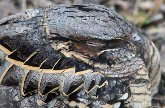The New York Times has an interesting piece on a couple of paleontologists who do things like write doctoral dissertations on fossils from the Cretaceous era about a hundred million years ago, but who also are young earth creationists who think that the earth is ten thousand years old at the most. Apparently, they think of themselves as working in two different “paradigms,” both of which are valid. This talk of being in two different paradigms at once strikes me as rather schizophrenic, but that there are people — and very bright ones at that — who do this is fascinating.
What I found appalling, though, is that apparently there are many in the science community who think that people like this should be denied degrees. I thought scientists were always proud of the fact that their disciplines rely on objective facts that can be experimentally confirmed, measured, and so forth, and that likewise it is a straightforward matter to determine who has mastered the discipline. Well, the paleontologists in question mastered the facts, by all accounts. But that’s not enough anymore? They also have to affirm philosophical orthodoxy before they can be initiated into the religion of science??
This two paradigms talk may be crazy, but if it is, it is so for philosophical reasons. Science is certainly not the place to turn to find out if paradigm-relative truth is a coherent idea.
But perhaps scientists are also philosophers? I must say that I was amused by the quotation from Dr. Dini of Texas Tech, who said that we “ought to make certain the people they are conferring advanced degrees on understand the philosophy of science and are indeed philosophers of science. That’s what Ph.D. stands for.” Last time I checked it was mostly people in philosophy departments who did philosophy of science. Indeed, I was under the impression that many scientists are mildly hostile to philosophers of science. Of course, Dr. Dini technically isn’t saying that most, or even some, scientists are philosophers of science. Rather, he’s saying that they ought to be. But I fear that he has a lot of colleagues unpersuaded by that normative claim.
But perhaps the idea just is that scientists ought to be philosophers in the sense that they accept some inchoate philosophy of materialism or scientism, formulated just precisely enough to be able to rule young earth paleontologists as unacceptable but not precisely enough to actually sustain philosophical debate. After all, such debate might raise questions about the rational justification for such materialism or scientism. And questions threaten orthodoxies.
Sydney

 Alan Schmierer
Alan Schmierer